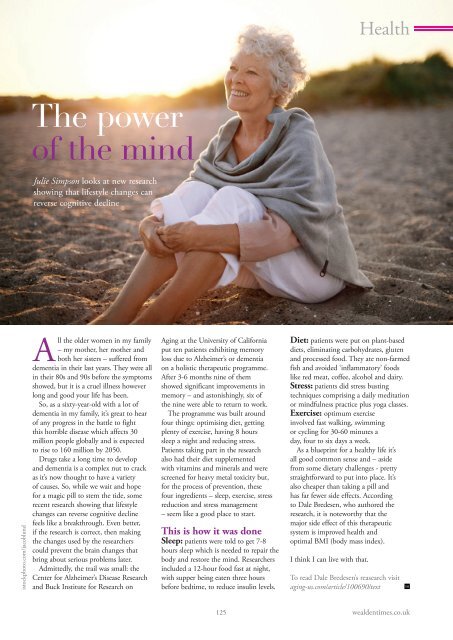Surrey Homes | SH33 | July 2017 | Interiors supplement inside
The lifestyle magazine for Surrey - Inspirational Interiors, Fabulous Fashion, Delicious Dishes
The lifestyle magazine for Surrey - Inspirational Interiors, Fabulous Fashion, Delicious Dishes
Create successful ePaper yourself
Turn your PDF publications into a flip-book with our unique Google optimized e-Paper software.
Health<br />
The power<br />
of the mind<br />
Julie Simpson looks at new research<br />
showing that lifestyle changes can<br />
reverse cognitive decline<br />
istockphoto.com/jacoblund<br />
All the older women in my family<br />
– my mother, her mother and<br />
both her sisters – suffered from<br />
dementia in their last years. They were all<br />
in their 80s and 90s before the symptoms<br />
showed, but it is a cruel illness however<br />
long and good your life has been.<br />
So, as a sixty-year-old with a lot of<br />
dementia in my family, it’s great to hear<br />
of any progress in the battle to fight<br />
this horrible disease which affects 30<br />
million people globally and is expected<br />
to rise to 160 million by 2050.<br />
Drugs take a long time to develop<br />
and dementia is a complex nut to crack<br />
as it’s now thought to have a variety<br />
of causes. So, while we wait and hope<br />
for a magic pill to stem the tide, some<br />
recent research showing that lifestyle<br />
changes can reverse cognitive decline<br />
feels like a breakthrough. Even better,<br />
if the research is correct, then making<br />
the changes used by the researchers<br />
could prevent the brain changes that<br />
bring about serious problems later.<br />
Admittedly, the trail was small: the<br />
Center for Alzheimer’s Disease Research<br />
and Buck Institute for Research on<br />
Aging at the University of California<br />
put ten patients exhibiting memory<br />
loss due to Alzheimer’s or dementia<br />
on a holistic therapeutic programme.<br />
After 3-6 months nine of them<br />
showed significant improvements in<br />
memory – and astonishingly, six of<br />
the nine were able to return to work.<br />
The programme was built around<br />
four things: optimising diet, getting<br />
plenty of exercise, having 8 hours<br />
sleep a night and reducing stress.<br />
Patients taking part in the research<br />
also had their diet <strong>supplement</strong>ed<br />
with vitamins and minerals and were<br />
screened for heavy metal toxicity but,<br />
for the process of prevention, these<br />
four ingredients – sleep, exercise, stress<br />
reduction and stress management<br />
– seem like a good place to start.<br />
This is how it was done<br />
Sleep: patients were told to get 7-8<br />
hours sleep which is needed to repair the<br />
body and restore the mind. Researchers<br />
included a 12-hour food fast at night,<br />
with supper being eaten three hours<br />
before bedtime, to reduce insulin levels.<br />
Diet: patients were put on plant-based<br />
diets, eliminating carbohydrates, gluten<br />
and processed food. They ate non-farmed<br />
fish and avoided ‘inflammatory’ foods<br />
like red meat, coffee, alcohol and dairy.<br />
Stress: patients did stress busting<br />
techniques comprising a daily meditation<br />
or mindfulness practice plus yoga classes.<br />
Exercise: optimum exercise<br />
involved fast walking, swimming<br />
or cycling for 30-60 minutes a<br />
day, four to six days a week.<br />
As a blueprint for a healthy life it’s<br />
all good common sense and – aside<br />
from some dietary challenges - pretty<br />
straightforward to put into place. It’s<br />
also cheaper than taking a pill and<br />
has far fewer side effects. According<br />
to Dale Bredesen, who authored the<br />
research, it is noteworthy that the<br />
major side effect of this therapeutic<br />
system is improved health and<br />
optimal BMI (body mass index).<br />
I think I can live with that.<br />
To read Dale Bredesen’s reasearch visit<br />
aging-us.com/article/100690/text<br />
125 wealdentimes.co.uk


















